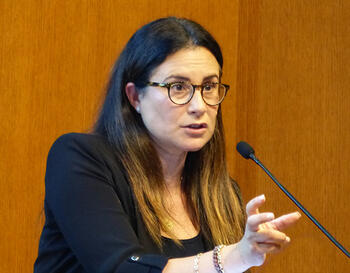The Art of Optimism: Improving Health Care Through Law and a Fresh Perspective
Why would a lawyer teach in an art museum?
For Ximena Benavides, the experience helped reset how she observes and processes the world. And informed how she hopes to make it better.
“Lawyers, when we go to law school, I think we can forget how to observe from scratch,” Benavides said. “We want to demonstrate elevated thinking, and in the process, we can forget how to make a simple inventory of observations. But the art of looking or the art of visual thinking, as taught in museums, allows us to reset our minds. To rely on our senses and look again from a different angle.”
At Yale, Benavides is a lecturer and postdoctoral associate at the Institution for Social and Policy Studies’ Program on Ethics, Politics, and Economics. But before earning her doctorate at Yale Law School in 2022, she taught for five years at the Yale University Art Gallery. And she has often moved her classes on health care business ethics to the gallery or brought art to class, working with the staff to select pieces connected to the subjects of social justices they study.
“We can all benefit from taking the time to really look and listen,” she said of an approach that has helped to guide her research on equitable access to health care. “Sometimes we are up in the mountain and forget what is down in the valley. The art of looking gives us the skills to hold on and breathe. Make a pause. It challenges us to think again, pay attention to the observers next to us, see what they are seeing in the same painting, and understand their observations and motivations.”
Benavides earned her law degree at Pontificia Universidad Católica del Perú, in the country where she grew up. She practiced corporate law involving international finance for more than 10 years before pursuing a doctoral degree at Yale.
“I always felt the private sector had a moral obligation — and is well positioned — to build a stronger democracy,” she said. “I wanted to find a way to help them meet that obligation.”
At Yale, Susan Rose-Ackerman, Henry R. Luce Professor Emeritus of Jurisprudence, mentored Benavides’ in how to approach the political economy of corruption and health care, recognize the incentives at stake, and look for realistic solutions.
“She helped me find my authentic way of teaching and translate my research into action,” she said. “A way to play an active role in promoting and improving democracy.”
While at the law school, Benavides joined the ISPS Policy Fellows Program, which supports graduate and professional students in researching U.S. domestic policy. Over the course of a year, fellows undertake research projects addressing urgent policy issues and gain the skills to turn their findings into actionable policy recommendations.
“That year, I was the only law student,” Benavides said. “It was a great opportunity to learn from people researching in political science, economics, sociology, and more. We had a military veteran in the group. Jacob Hacker led the program but also contributed to debates as a fellow scholar. Monica Bell gave a talk about race and law. It was a great year.”
Her latest research emphasizes the importance of examining health market economies from a political perspective. She investigates how policy decisions can exacerbate health inequities within the industrialized health care sector.
“Ximena has been a wonderful addition to our team,” said EP&E Director Ana de la O. “Her work at the crossroads of law, ethics, and political economy provides crucial perspectives on ensuring fair access to health care. And her thoughtful and caring approach toward teaching has been a great asset for our students.”
Benavides believes we can remedy the health inequities in the United States by shifting away from the same actors and the same policies that traditionally serve as the focus of reformers. And she suggests constructing more “bypasses” to existing systems than seeking to rebuild a system from the bottom-up.
“We have to think about realistic options,” she said, using Obamacare as an example of how to make important improvements after decades of false starts. “We need to think about the time and place we are living in and observe why things are happening and who is making them happen.”
She believes concentrated power — not necessarily only profits — fuel the problem.
“We have very few stakeholders amassing a lot of patents, knowledge, and technology,” she said. If this handful of players in the market are the only ones who can produce a product, they are in a very comfortable position to request more funds form the government and more industry-friendly policies.”
In a recent presentation to high school students participating in the Yale Global Scholars program, Benavides discussed how the price of insulin continues to rise even as demand grows and the cost to produce it remains low.
“We have people who ration their medication, even if some people cannot go a day without possibly dying,” she said. “It is even possible for one of the three dominant manufacturers to discontinue insulin production without a backup plan. And so, we overstretched clinicians who now must sort out how to transition to other types of insulin without causing more harm to patients.”
She does not favor price controls, which could limit competition. Instead, she suggested the U.S. government should introduce incentives for pharmaceutical companies to resist raising prices.
“A large part of medicines in the United States are supported by the government,” she said. “Only occasionally does the government set conditions on the funds they give to companies, and even the conditions they do set are not impactful enough.”
As an example, she mentioned how companies pledged not to enforce their patents on their COVID-19 vaccines so others could develop and distribute them more widely and then changed course and fought successfully in court to maintain exclusive control.
In the future, Benavides said that prior to supplying funding to private companies, the government should set conditions that companies must meet certain goals during the research and development of health technology to promote wider access to its medications. For example, the government could require public health goals for a patent to remain valid.
Such incentives would improve access, promote more innovation, and still stimulate profit for the company, she said.
“We just don’t have these types of provisions in contracts with pharmaceutical companies,” she said. “We are not demanding a public health return on our public investment, only expecting more medicines — and not necessarily safer and more effective medicines — that create more private profits for the industry.”
Benavides promoted creating incentives to produce more publicly oriented results, rebalance power among stakeholders, promote sustainable and democratic innovation, and reflect more long-term thinking.
“We need to center our policy choices on patients, doctors, and providers of medical care,” she said. “We need care that cares.”
And as Benavides observes the many economic, legal, and political hurdles confronting efforts to improve health outcomes for everyone, she stops to take a breath. Looks around. Listens. And expresses optimism.
“The system is broken, yes,” she said. “By poor policy choices. The good news is we can fix it with better policy choices.”













